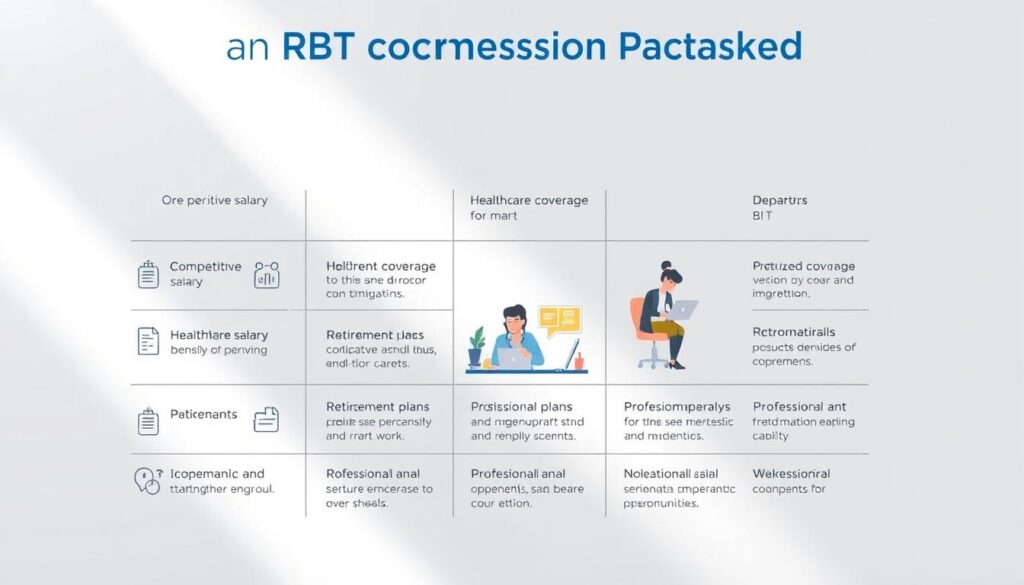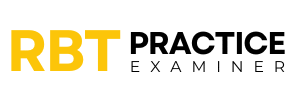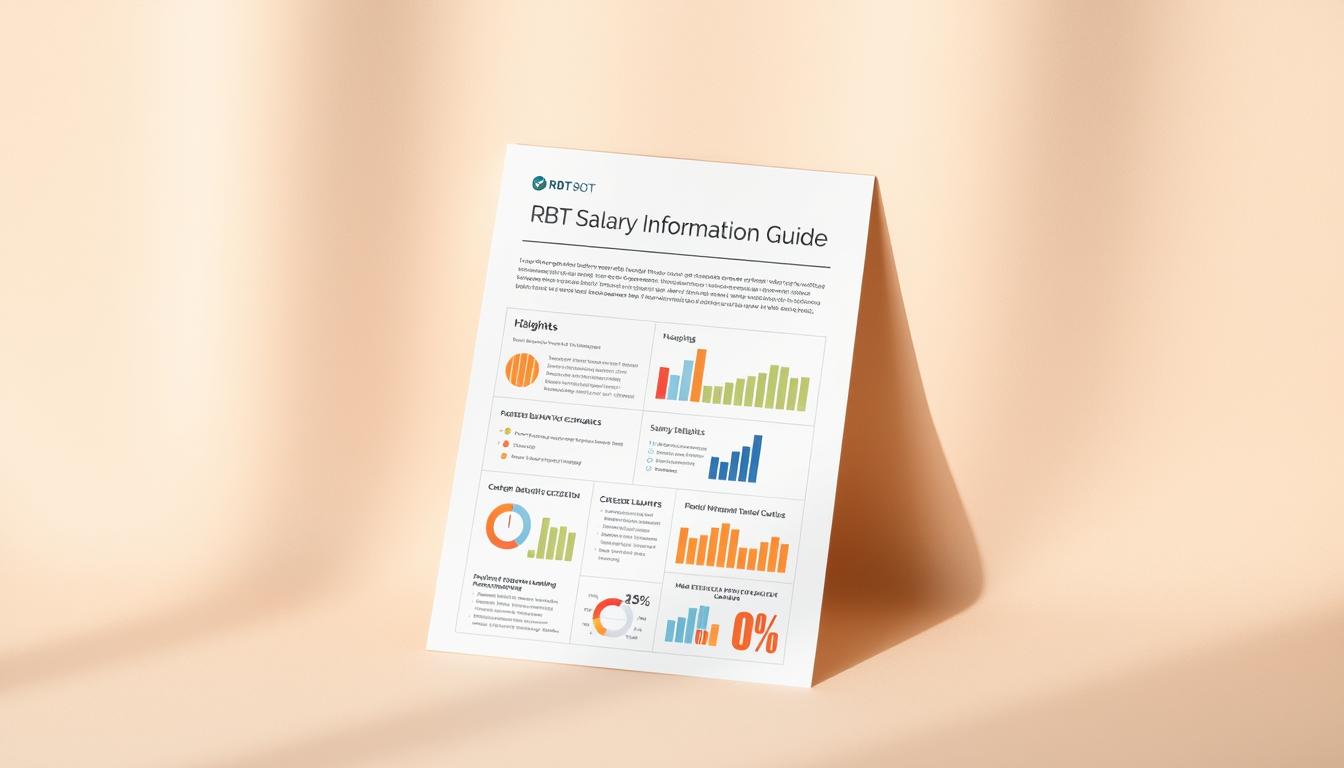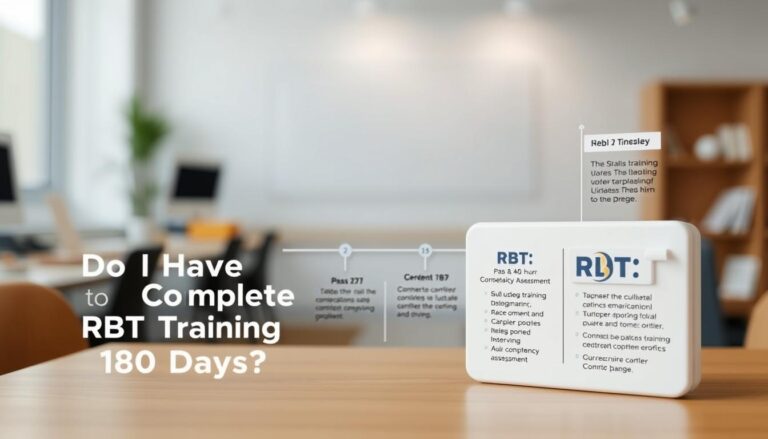RBT Salary: Exploring the Earnings of Registered Behavior Technicians
Registered Behavior Technicians (RBTs) are key in helping people with autism and developmental issues. Knowing how much RBTs earn is vital for those thinking about this career. It’s a field that’s growing and offers a lot of opportunities.
The need for skilled RBTs is rising across the U.S. This makes it a great choice for those interested in behavioral health. The pay for RBTs varies based on experience, where you work, and your location.
This guide will look closely at what RBTs earn. We’ll talk about salary ranges, job chances, and how to make more money. It’s important for both current RBTs and those thinking about joining the field to understand the money side of things.
We’ll examine national salary averages, how pay changes by location, and what affects RBT earnings. By the end of this article, you’ll know the financial possibilities in this important healthcare role.
Understanding the Role of a Registered Behavior Technician
Registered Behavior Technicians (RBTs) are vital in helping people with behavioral issues, like autism. They work closely with Board Certified Behavior Analysts (BCBAs). Together, they use important strategies to help clients improve their lives.
Core Responsibilities and Duties
RBTs have many important tasks. They help clients make progress. Their main jobs include:
- Implementing behavior intervention plans developed by BCBAs
- Collecting and documenting detailed behavioral data
- Conducting direct client observations
- Providing one-on-one skill training and support
- Communicating regularly with supervisors about client progress
Educational Requirements and Certification
To become an RBT, you need certain education and credentials. The process involves:
- High school diploma or equivalent
- 40-hour training program in applied behavior analysis
- Passing a thorough certification exam
- Background check and professional screening
- Ongoing supervision from a certified BCBA
The pay for RBTs can change based on their education and certification. The more training and certification, the better the pay.
Career Growth Opportunities
RBTs can move up in their careers. Many aim for higher certifications like Board Certified Behavior Analyst (BCBA). This can lead to better pay and more career opportunities.
Continuous learning and professional growth are essential for success in this field.
How Much Do RBT Get Paid: A Complete Overview
Knowing how much RBTs earn is key for those starting in behavioral health. RBTs make between $16 and $25 an hour. Beginners earn less, while those with more experience can earn more.
RBT pay changes based on a few important things:
- Where they work
- The setting
- How long they’ve been working
- Any extra certifications
It’s important to look at different work settings when figuring out RBT pay. Some work in clinics, while others go to homes. This can affect how much they make.
| Experience Level | Hourly Wage Range | Annual Salary Estimate |
|---|---|---|
| Entry-Level | $16 – $18 | $33,280 – $37,440 |
| Mid-Level | $19 – $22 | $39,520 – $45,760 |
| Experienced | $23 – $25 | $47,840 – $52,000 |
Those starting out in RBT should know that pay can go up with more skills and experience. Keeping up with professional development can really help your career and pay.
National Average Salary for RBTs in 2024
Knowing about RBT salaries is key for those thinking about this career. The RBT salary range in 2024 shows the high demand for these skilled workers in the U.S.
Registered Behavior Technicians earn different amounts based on several factors. Here are the main salary insights for 2024:
Entry-Level vs Experienced RBT Salaries
New RBTs start with different pay than those with more experience:
- Entry-level RBTs start at $18-$22 per hour
- Those with 3-5 years of experience earn $25-$35 per hour
- Advanced certifications can lead to higher pay
Full-Time vs Part-Time Compensation
Full-time and part-time RBT jobs pay differently:
- Full-time RBTs get:
- A full benefits package
- Set hours each week
- Health insurance may be included
- Part-time RBTs usually get:
- Flexible schedules
- Hourly pay without extra benefits
- Can work at multiple part-time jobs
Overtime and Holiday Pay Rates
There are ways to earn more in your RBT job:
- Overtime pay: 1.5 times your regular hourly rate
- Holiday pay can be 1.5x to 2x your regular rate
- Some jobs offer bonuses based on performance
It’s important to check your contract for specific pay details in your RBT job.
Geographic Variations in RBT Compensation
The pay for registered behavior technicians changes a lot across the United States. Knowing these differences helps RBTs make better career choices and earn more.
RBT salaries vary a lot based on where you are. Several things affect these differences:
- Cost of living in specific metropolitan areas
- Local demand for behavioral health services
- State-specific healthcare regulations
- Concentration of autism treatment centers
Big cities usually pay more than rural areas. States like California, New York, and Massachusetts have higher salaries for RBTs. These places have strong healthcare systems and more people needing help.
The southwest and midwest have lower but fair salaries for RBTs. Things like local funding, healthcare, and the economy affect how much they get paid.
If you’re thinking about moving, look up salary trends in your new area. The Bureau of Labor Statistics has lots of data on salaries for health jobs.
- Top-paying states for RBTs:
- California
- New York
- Massachusetts
- Emerging markets with growing RBT opportunities:
- Texas
- Florida
- Washington
When choosing where to work, think about both salary and job growth. This helps RBTs find the best place for their career.
Factors Affecting RBT Salary Rates
To understand how much RBTs earn, we must look at several key factors. These elements shape their salary rates. Registered Behavior Technicians see different pay based on these factors.
RBT salaries vary widely. Many factors play a role in how much they earn:
Experience Level Impact
Experience greatly affects RBT salaries. More experience means higher pay. Here’s how salaries typically grow:
- Entry-level RBTs start with a base salary
- Mid-level workers see 10-15% pay increases
- Those with 5+ years of experience earn much more
Education and Additional Certifications
Higher education and certifications also matter. They can increase earnings:
- Advanced ABA certifications
- Specialized training in behavioral interventions
- Graduate degrees in behavioral sciences
Workplace Setting Influence
The work environment also impacts pay. Different settings offer different salary ranges:
- Clinical settings: Typically offer set salaries
- School districts: May provide good benefits
- Private practice: Offers unique pay options
Those looking to increase their RBT salary should consider these factors. Planning your career path wisely can help.
Benefits and Compensation Packages for RBTs

Registered Behavior Technicians (RBTs) get more than just a salary. Their compensation packages include many benefits. These extras can greatly improve your job satisfaction and financial health. The average RBT pay rate covers more than just hourly wages.
Typical benefits for RBTs often include:
- Health insurance coverage
- Retirement savings plans
- Paid time off
- Professional development opportunities
- Continuing education support
When looking at job offers, RBTs should think about the whole package. It’s not just the base pay that matters. Many employers offer extra financial perks that boost your total compensation.
| Benefit Type | Typical Value | Potential Impact |
|---|---|---|
| Health Insurance | $5,000-$7,500 annually | Significant cost savings |
| Retirement Matching | Up to 4% of salary | Long-term financial growth |
| Professional Development | $1,000-$2,000 per year | Career advancement support |
Pro tip: Always negotiate your total compensation package, not just the base salary. Ask about extra benefits that can improve your financial situation.
Some employers offer special perks like flexible hours and help with certification. They also offer bonuses based on performance. These extras can greatly increase your job satisfaction and total compensation as an RBT.
Comparing RBT Salaries Across Different Work Settings
Registered Behavior Technicians (RBTs) find work in many places, affecting their pay. Knowing how pay changes in different jobs helps them choose wisely.
RBT salaries change a lot based on where they work. Each place has its own pay rules and challenges.
Clinical Settings: Structured Compensation
Clinical jobs usually have set pay for RBTs. These places often have:
- Fixed hourly rates
- Regular schedules
- Benefits like health insurance
Home-Based Services: Flexible Earnings
Working from home as an RBT has its own pay system. It comes with benefits like:
- Higher pay per hour
- Money for travel
- Flexible hours
| Work Setting | Average Hourly Rate | Benefits |
|---|---|---|
| Clinical Settings | $18 – $22 | Health Insurance, Paid Training |
| Home-Based Services | $20 – $25 | Mileage Reimbursement, Flexible Hours |
| School District | $17 – $20 | Consistent Schedule, Educational Benefits |
School District Employment Opportunities
School districts offer stable jobs for RBTs. These jobs have regular hours and chances for career growth.
It’s important for professionals to look at more than just the hourly rate when choosing a job.
Career Advancement and Salary Growth

Registered Behavior Technicians (RBTs) have many career paths to explore. These paths can greatly increase their salaries. Moving from an entry-level RBT to more advanced roles offers both financial and professional growth.
Advancing in the applied behavior analysis (ABA) field follows a clear path. RBTs can choose from several career paths:
- Board Certified Assistant Behavior Analyst (BCaBA)
- Board Certified Behavior Analyst (BCBA)
- Senior Behavior Specialist
- Clinical Director
To move up, RBTs need more education and certifications. For example, becoming a BCaBA requires a bachelor’s degree and specific courses in behavior analysis. A BCBA needs a master’s degree, leading to higher salaries.
| Career Level | Typical Salary Range | Education Required |
|---|---|---|
| RBT | $35,000 – $45,000 | High School/Certification |
| BCaBA | $45,000 – $55,000 | Bachelor’s Degree |
| BCBA | $65,000 – $85,000 | Master’s Degree |
Those who keep learning can see big salary increases. Getting specialized certifications, advanced degrees, and gaining experience in different settings can help. This can speed up career growth and boost earnings.
Planning your career wisely is key. It means knowing what’s needed for each step and making a plan for the future. RBTs who love behavioral science can build rewarding and well-paying careers.
Industry Trends Affecting RBT Compensation
The world of Registered Behavior Technician (RBT) pay is changing fast. It’s shaped by key trends in the industry. To understand how much RBTs earn, we need to look closely at these trends and new chances.
Market Demand and Growth Trajectory
The behavioral health field is growing fast, which affects RBT pay. This growth comes from:
- More kids being diagnosed with autism spectrum disorder
- More people learning about applied behavior analysis (ABA) therapy
- More insurance covering behavioral health services
This demand boom means more jobs and possibly better pay for RBTs in various settings.
Legislative Landscape Influencing Compensation
New laws are changing how much RBTs get paid. State-level regulations and federal healthcare laws are key in setting pay and standards.
- New certification rules
- More training needs
- Higher minimum wages for healthcare jobs
RBTs who keep up with these laws can get better pay and move up in their careers.
Negotiating Your RBT Salary

As a Registered Behavior Technician (RBT), salary talks need careful planning and confidence. Knowing the average RBT pay helps you go into talks with a clear plan.
Starting with solid research is key. RBTs should look up the RBT salary range in their area and job type. This info lets you make smart salary requests.
- Research local market rates for RBT positions
- Document personal achievements and specialized skills
- Prepare a professional portfolio highlighting expertise
- Practice articulating your value proposition
When talking about pay, highlight what makes you stand out. Quantifiable achievements like client success, extra certifications, or special training boost your negotiation power.
Effective salary talks involve:
- Asking for a salary range, not a single number
- Showing flexibility and professionalism
- Understanding how the employer pays
- Being ready to discuss benefits beyond salary
With confidence and good prep, salary talks can become chances for both sides to win.
Common RBT Salary Structures and Payment Models
Registered Behavior Technicians (RBTs) face different payment structures that affect their hourly wages. Knowing these models helps them make better career choices.
RBT remuneration data shows several main payment ways:
- Hourly Wage Model: Most common compensation structure
- Salaried Position: Fixed annual compensation
- Performance-Based Compensation: Bonus structures tied to client outcomes
Hourly wages for RBT usually fall between $15-$25. This depends on experience and where you work. The payment model greatly affects how much you can earn.
Different places offer unique ways to pay:
- Clinical Settings: Structured hourly rates
- Private Practice: Potentially higher per-hour compensation
- School Districts: Consistent salary with benefits
Key considerations when evaluating RBT compensation include:
- Base hourly rate
- Additional performance incentives
- Professional development opportunities
- Benefits package
RBT professionals should think carefully about each payment model. The right one matches their career goals and financial needs.
Finding High-Paying RBT Positions
Looking for a job as a registered behavior technician needs careful planning and inside tips. Knowing how much RBTs get paid can help you earn more. It also helps you find great jobs in applied behavior analysis.
Strategic Job Search Approaches
There are many ways to find good RBT jobs:
- Leverage professional networking platforms like LinkedIn
- Join behavior analysis professional associations
- Attend specialized job fairs and conferences
- Connect with local autism treatment centers
- Utilize specialized healthcare job boards
Top-Paying Employers in ABA
Some companies pay RBTs well. Look for places that value your growth and pay well.
- Large healthcare networks
- Specialized autism treatment centers
- Private clinical practices
- Educational institutions with robust special needs programs
When looking for a high-paying RBT job, highlight your skills and growth. Networking and continuous professional development can really boost your salary in this field.
Conclusion
Exploring the RBT salary landscape shows a promising career path in applied behavior analysis. To understand how much RBT get paid, we must consider several factors. These include location, experience, and workplace.
The salary range for RBTs is wide, with chances for growth and development. Aspiring behavior technicians can boost their earnings by getting more certifications and gaining experience. Choosing the right job setting is also key.
Jobs in cities and specialized clinics often pay more. Those who keep learning and excel in their skills will see their career and earnings grow.
The field of applied behavior analysis is growing, opening up many opportunities for RBTs. Those who want to help people with developmental challenges can find both personal and financial rewards. By staying updated and growing professionally, RBTs can have fulfilling careers.
The future for RBT salaries looks bright, with more jobs in healthcare, education, and therapy. Those thinking about this career should see it as a chance for personal growth and impact.







